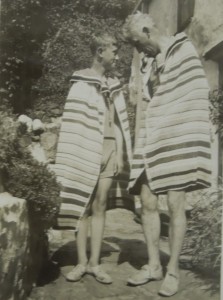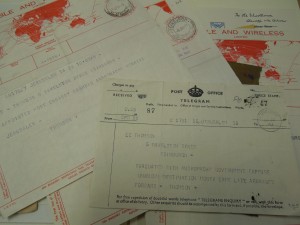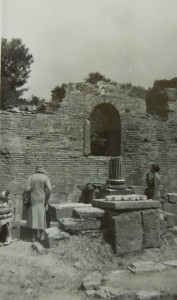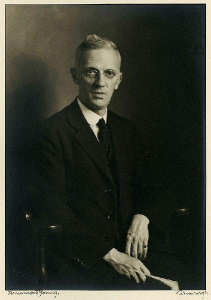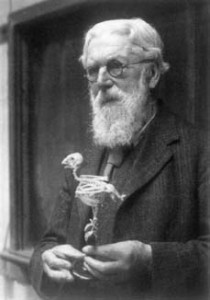Valentines Day. A wonderful time of year when we can indulge in levels of cynicism and sarcasm simply unacceptable at any other! However, here in the archives our hardened hearts are often shamefully disarmed by the traces of friendship, romance, and (dare I say it!) love we come across every day within our collections.
Those of you familiar with Greek mythology may know the story of Hector and Andromache – Hector the bold Trojan warrior, and Andromache, his beautiful wife. For those who do not, the story doesn’t end happily, with Hector killed at the hands of Achilles. Today’s Valentine’s blog is about another Hector and Andromache – Hector Thomson, the son of Godfrey Thomson, and his rather beautiful wife, the aptly named Andromache.
From the outset, despite their fateful monikers, the pair seemed a rather unlikely match. Hector, according to one family friend, was socially awkward, quiet, and was most likely to be found with his nose in a book. Andromache, according to the traces of her in the letters of others, was the sort of house guest welcome at every home, who could bring cheer to even the most despondent of households.
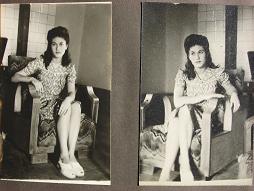
Sadly we have no photographs of Andromache in the archives. This scan was given to us by a relative.
Hector began his career as an Oxford educated Classicist. Perhaps surprisingly when compared to the accounts we have regarding his boyhood, he finished his degree with a yearning of adventure, and entered the diplomatic service, working in Baghdad.
At some point in 1939, he found himself teaching at the English School in Nicosia, Cyprus. It was here the somewhat socially awkward Hector met the vivacious Andromache! The pair quickly fell in love – in one letter from his father, Hector is told:
We would dearly love to hear from you, and especially to hear more about Andromache, but I know communication must be precarious.
His parents, of course, had their own love story.
Hector also fell in love with Cyprus – his letters to Thomson from this period discuss both the language and the religion of the Cypriots in great detail. Details which Thomson with his enquiring mind would have found fascinating. References to Andromache in the surviving letters are brief, with the Thomson’s sending their love and asking how she is – but we know in later years that the Thomsons, along with many of their friends and acquaintances, would affectionately call her ‘Mackie’.
After their wedding, they settled in Aberdeen where Hector eventually became senior lecturer in Ancient and Modern Greek at the University of Aberdeen. Hector’s teaching techniques owed a lot to his Father’s career as a psychologist and professor of education, throughout which Thomson emphasised the need to gain and keep the attention of students and pupils. This is by no means an uncommon idea now, but one which was new and innovative in Thomson’s time.
His Father’s methods are reflected in the many ways Hector grabbed and maintained the attention of his students, apparently even making yoghurt in one lecture! He endeavored not only to teach his students Greek, but invited them to share in his love of Greek culture.
Following his retirement, he and Andromache spent their time between the Thomson’s former home in Ravelston Dykes, Edinburgh (left to Hector in their will), and Cyprus. Hector died on 19th February 2008, aged 91. According to her relations, Andromache was bereft after his death, and decided to move back to Cyprus permanently. A few short months later, she too passed away. Hector and ‘Mackie’ were married for 67 years – they were a true love match. Now that, dear readers, is better than chocolates, flowers, and stuffed toys clutching hearts!
